HOT301: Analysis of Uber's Entrepreneurial Strategies and Impact
VerifiedAdded on 2022/08/21
|8
|1961
|13
Report
AI Summary
This report provides a comprehensive analysis of Uber's entrepreneurial journey, examining its history, core strategies, and impact on the hospitality industry. It delves into the application of entrepreneurial schools of thought, particularly the financial/capital and ecological perspectives, to understand Uber's operations and decision-making processes. The report identifies two key emerging trends influencing Uber: the increasing importance of digitalization and the rise of driverless technology. It further highlights the opportunities these trends present, such as expanding into new markets and developing innovative transportation solutions. The report also acknowledges the challenges Uber faces, including regulatory issues, competition, and the need for sustainable practices. Overall, the analysis offers valuable insights into Uber's entrepreneurial approach and its role in shaping the future of the transportation and hospitality sectors, based on a case study report from the University of Wollongong.
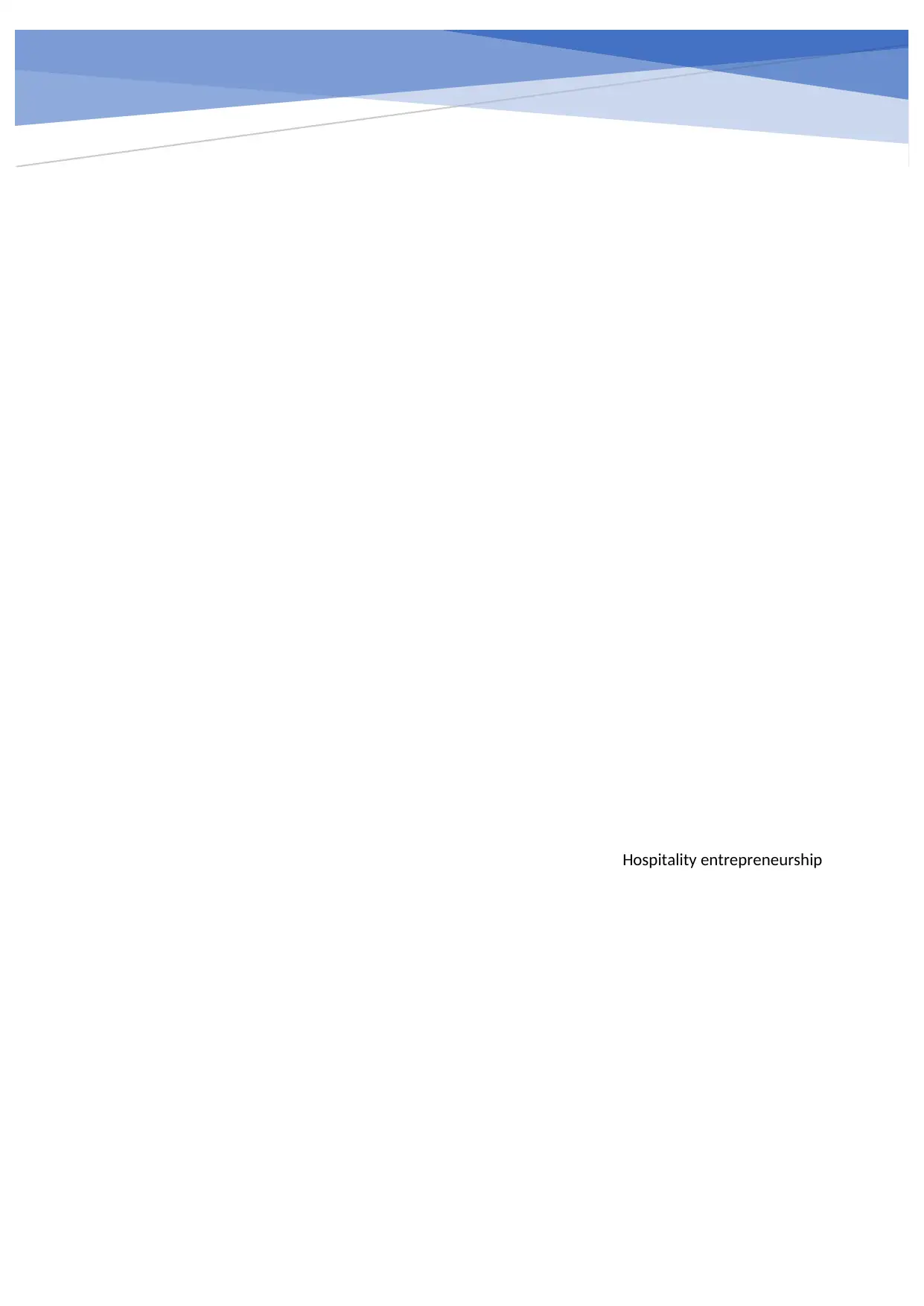
Hospitality entrepreneurship
Paraphrase This Document
Need a fresh take? Get an instant paraphrase of this document with our AI Paraphraser
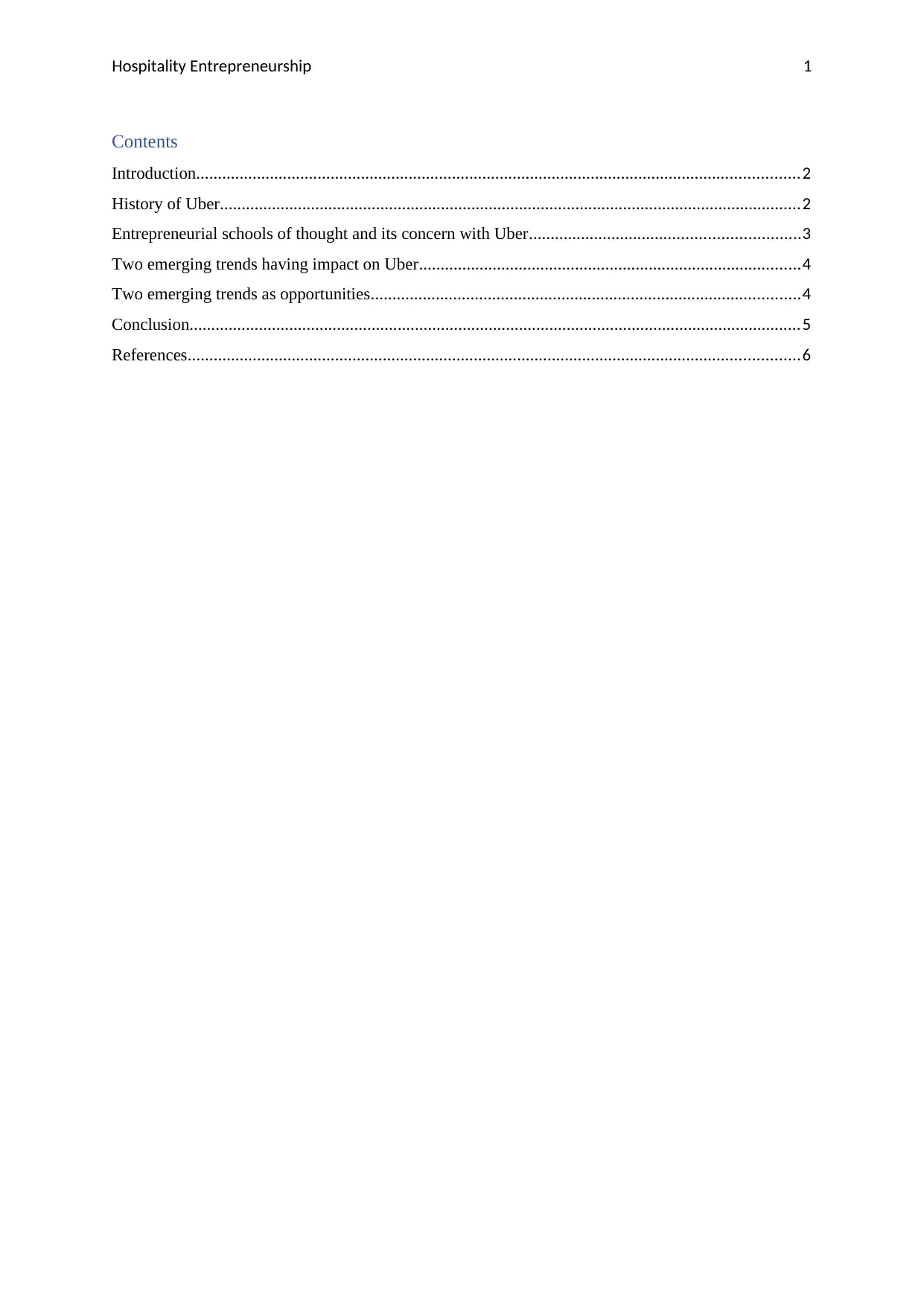
Hospitality Entrepreneurship 1
Contents
Introduction...........................................................................................................................................2
History of Uber......................................................................................................................................2
Entrepreneurial schools of thought and its concern with Uber..............................................................3
Two emerging trends having impact on Uber........................................................................................4
Two emerging trends as opportunities...................................................................................................4
Conclusion.............................................................................................................................................5
References.............................................................................................................................................6
Contents
Introduction...........................................................................................................................................2
History of Uber......................................................................................................................................2
Entrepreneurial schools of thought and its concern with Uber..............................................................3
Two emerging trends having impact on Uber........................................................................................4
Two emerging trends as opportunities...................................................................................................4
Conclusion.............................................................................................................................................5
References.............................................................................................................................................6
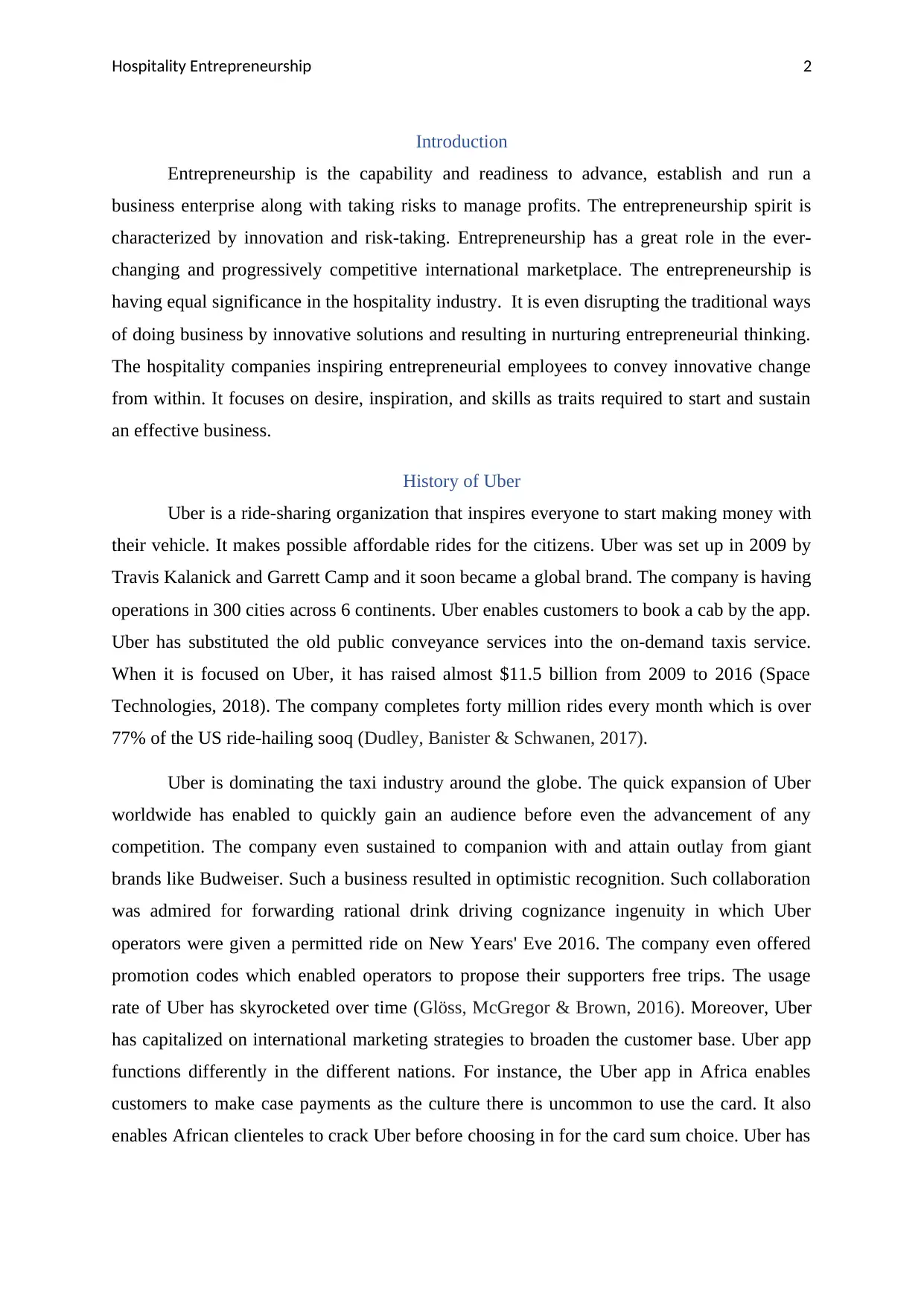
Hospitality Entrepreneurship 2
Introduction
Entrepreneurship is the capability and readiness to advance, establish and run a
business enterprise along with taking risks to manage profits. The entrepreneurship spirit is
characterized by innovation and risk-taking. Entrepreneurship has a great role in the ever-
changing and progressively competitive international marketplace. The entrepreneurship is
having equal significance in the hospitality industry. It is even disrupting the traditional ways
of doing business by innovative solutions and resulting in nurturing entrepreneurial thinking.
The hospitality companies inspiring entrepreneurial employees to convey innovative change
from within. It focuses on desire, inspiration, and skills as traits required to start and sustain
an effective business.
History of Uber
Uber is a ride-sharing organization that inspires everyone to start making money with
their vehicle. It makes possible affordable rides for the citizens. Uber was set up in 2009 by
Travis Kalanick and Garrett Camp and it soon became a global brand. The company is having
operations in 300 cities across 6 continents. Uber enables customers to book a cab by the app.
Uber has substituted the old public conveyance services into the on-demand taxis service.
When it is focused on Uber, it has raised almost $11.5 billion from 2009 to 2016 (Space
Technologies, 2018). The company completes forty million rides every month which is over
77% of the US ride-hailing sooq (Dudley, Banister & Schwanen, 2017).
Uber is dominating the taxi industry around the globe. The quick expansion of Uber
worldwide has enabled to quickly gain an audience before even the advancement of any
competition. The company even sustained to companion with and attain outlay from giant
brands like Budweiser. Such a business resulted in optimistic recognition. Such collaboration
was admired for forwarding rational drink driving cognizance ingenuity in which Uber
operators were given a permitted ride on New Years' Eve 2016. The company even offered
promotion codes which enabled operators to propose their supporters free trips. The usage
rate of Uber has skyrocketed over time (Glöss, McGregor & Brown, 2016). Moreover, Uber
has capitalized on international marketing strategies to broaden the customer base. Uber app
functions differently in the different nations. For instance, the Uber app in Africa enables
customers to make case payments as the culture there is uncommon to use the card. It also
enables African clienteles to crack Uber before choosing in for the card sum choice. Uber has
Introduction
Entrepreneurship is the capability and readiness to advance, establish and run a
business enterprise along with taking risks to manage profits. The entrepreneurship spirit is
characterized by innovation and risk-taking. Entrepreneurship has a great role in the ever-
changing and progressively competitive international marketplace. The entrepreneurship is
having equal significance in the hospitality industry. It is even disrupting the traditional ways
of doing business by innovative solutions and resulting in nurturing entrepreneurial thinking.
The hospitality companies inspiring entrepreneurial employees to convey innovative change
from within. It focuses on desire, inspiration, and skills as traits required to start and sustain
an effective business.
History of Uber
Uber is a ride-sharing organization that inspires everyone to start making money with
their vehicle. It makes possible affordable rides for the citizens. Uber was set up in 2009 by
Travis Kalanick and Garrett Camp and it soon became a global brand. The company is having
operations in 300 cities across 6 continents. Uber enables customers to book a cab by the app.
Uber has substituted the old public conveyance services into the on-demand taxis service.
When it is focused on Uber, it has raised almost $11.5 billion from 2009 to 2016 (Space
Technologies, 2018). The company completes forty million rides every month which is over
77% of the US ride-hailing sooq (Dudley, Banister & Schwanen, 2017).
Uber is dominating the taxi industry around the globe. The quick expansion of Uber
worldwide has enabled to quickly gain an audience before even the advancement of any
competition. The company even sustained to companion with and attain outlay from giant
brands like Budweiser. Such a business resulted in optimistic recognition. Such collaboration
was admired for forwarding rational drink driving cognizance ingenuity in which Uber
operators were given a permitted ride on New Years' Eve 2016. The company even offered
promotion codes which enabled operators to propose their supporters free trips. The usage
rate of Uber has skyrocketed over time (Glöss, McGregor & Brown, 2016). Moreover, Uber
has capitalized on international marketing strategies to broaden the customer base. Uber app
functions differently in the different nations. For instance, the Uber app in Africa enables
customers to make case payments as the culture there is uncommon to use the card. It also
enables African clienteles to crack Uber before choosing in for the card sum choice. Uber has
⊘ This is a preview!⊘
Do you want full access?
Subscribe today to unlock all pages.

Trusted by 1+ million students worldwide
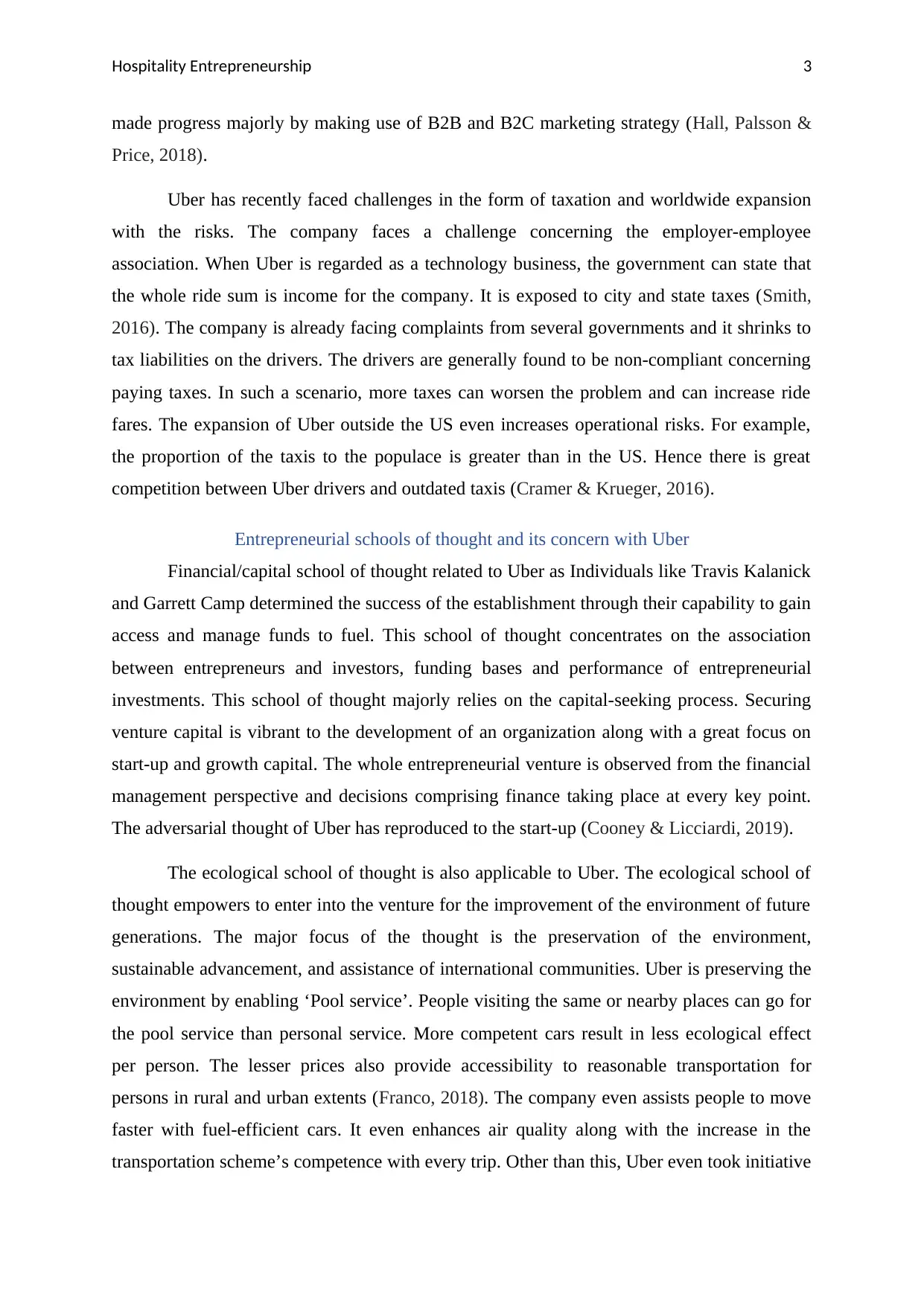
Hospitality Entrepreneurship 3
made progress majorly by making use of B2B and B2C marketing strategy (Hall, Palsson &
Price, 2018).
Uber has recently faced challenges in the form of taxation and worldwide expansion
with the risks. The company faces a challenge concerning the employer-employee
association. When Uber is regarded as a technology business, the government can state that
the whole ride sum is income for the company. It is exposed to city and state taxes (Smith,
2016). The company is already facing complaints from several governments and it shrinks to
tax liabilities on the drivers. The drivers are generally found to be non-compliant concerning
paying taxes. In such a scenario, more taxes can worsen the problem and can increase ride
fares. The expansion of Uber outside the US even increases operational risks. For example,
the proportion of the taxis to the populace is greater than in the US. Hence there is great
competition between Uber drivers and outdated taxis (Cramer & Krueger, 2016).
Entrepreneurial schools of thought and its concern with Uber
Financial/capital school of thought related to Uber as Individuals like Travis Kalanick
and Garrett Camp determined the success of the establishment through their capability to gain
access and manage funds to fuel. This school of thought concentrates on the association
between entrepreneurs and investors, funding bases and performance of entrepreneurial
investments. This school of thought majorly relies on the capital-seeking process. Securing
venture capital is vibrant to the development of an organization along with a great focus on
start-up and growth capital. The whole entrepreneurial venture is observed from the financial
management perspective and decisions comprising finance taking place at every key point.
The adversarial thought of Uber has reproduced to the start-up (Cooney & Licciardi, 2019).
The ecological school of thought is also applicable to Uber. The ecological school of
thought empowers to enter into the venture for the improvement of the environment of future
generations. The major focus of the thought is the preservation of the environment,
sustainable advancement, and assistance of international communities. Uber is preserving the
environment by enabling ‘Pool service’. People visiting the same or nearby places can go for
the pool service than personal service. More competent cars result in less ecological effect
per person. The lesser prices also provide accessibility to reasonable transportation for
persons in rural and urban extents (Franco, 2018). The company even assists people to move
faster with fuel-efficient cars. It even enhances air quality along with the increase in the
transportation scheme’s competence with every trip. Other than this, Uber even took initiative
made progress majorly by making use of B2B and B2C marketing strategy (Hall, Palsson &
Price, 2018).
Uber has recently faced challenges in the form of taxation and worldwide expansion
with the risks. The company faces a challenge concerning the employer-employee
association. When Uber is regarded as a technology business, the government can state that
the whole ride sum is income for the company. It is exposed to city and state taxes (Smith,
2016). The company is already facing complaints from several governments and it shrinks to
tax liabilities on the drivers. The drivers are generally found to be non-compliant concerning
paying taxes. In such a scenario, more taxes can worsen the problem and can increase ride
fares. The expansion of Uber outside the US even increases operational risks. For example,
the proportion of the taxis to the populace is greater than in the US. Hence there is great
competition between Uber drivers and outdated taxis (Cramer & Krueger, 2016).
Entrepreneurial schools of thought and its concern with Uber
Financial/capital school of thought related to Uber as Individuals like Travis Kalanick
and Garrett Camp determined the success of the establishment through their capability to gain
access and manage funds to fuel. This school of thought concentrates on the association
between entrepreneurs and investors, funding bases and performance of entrepreneurial
investments. This school of thought majorly relies on the capital-seeking process. Securing
venture capital is vibrant to the development of an organization along with a great focus on
start-up and growth capital. The whole entrepreneurial venture is observed from the financial
management perspective and decisions comprising finance taking place at every key point.
The adversarial thought of Uber has reproduced to the start-up (Cooney & Licciardi, 2019).
The ecological school of thought is also applicable to Uber. The ecological school of
thought empowers to enter into the venture for the improvement of the environment of future
generations. The major focus of the thought is the preservation of the environment,
sustainable advancement, and assistance of international communities. Uber is preserving the
environment by enabling ‘Pool service’. People visiting the same or nearby places can go for
the pool service than personal service. More competent cars result in less ecological effect
per person. The lesser prices also provide accessibility to reasonable transportation for
persons in rural and urban extents (Franco, 2018). The company even assists people to move
faster with fuel-efficient cars. It even enhances air quality along with the increase in the
transportation scheme’s competence with every trip. Other than this, Uber even took initiative
Paraphrase This Document
Need a fresh take? Get an instant paraphrase of this document with our AI Paraphraser
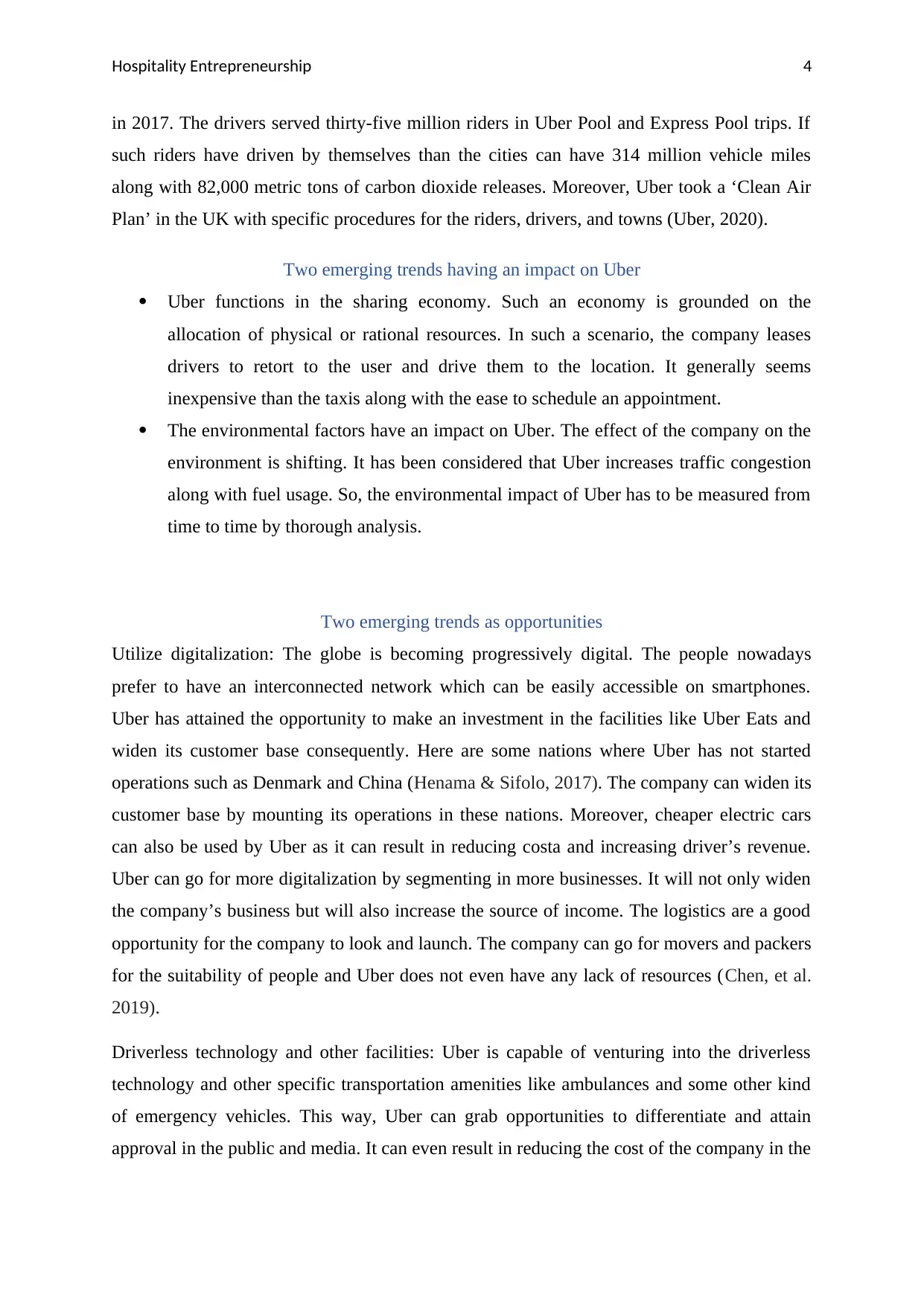
Hospitality Entrepreneurship 4
in 2017. The drivers served thirty-five million riders in Uber Pool and Express Pool trips. If
such riders have driven by themselves than the cities can have 314 million vehicle miles
along with 82,000 metric tons of carbon dioxide releases. Moreover, Uber took a ‘Clean Air
Plan’ in the UK with specific procedures for the riders, drivers, and towns (Uber, 2020).
Two emerging trends having an impact on Uber
Uber functions in the sharing economy. Such an economy is grounded on the
allocation of physical or rational resources. In such a scenario, the company leases
drivers to retort to the user and drive them to the location. It generally seems
inexpensive than the taxis along with the ease to schedule an appointment.
The environmental factors have an impact on Uber. The effect of the company on the
environment is shifting. It has been considered that Uber increases traffic congestion
along with fuel usage. So, the environmental impact of Uber has to be measured from
time to time by thorough analysis.
Two emerging trends as opportunities
Utilize digitalization: The globe is becoming progressively digital. The people nowadays
prefer to have an interconnected network which can be easily accessible on smartphones.
Uber has attained the opportunity to make an investment in the facilities like Uber Eats and
widen its customer base consequently. Here are some nations where Uber has not started
operations such as Denmark and China (Henama & Sifolo, 2017). The company can widen its
customer base by mounting its operations in these nations. Moreover, cheaper electric cars
can also be used by Uber as it can result in reducing costa and increasing driver’s revenue.
Uber can go for more digitalization by segmenting in more businesses. It will not only widen
the company’s business but will also increase the source of income. The logistics are a good
opportunity for the company to look and launch. The company can go for movers and packers
for the suitability of people and Uber does not even have any lack of resources (Chen, et al.
2019).
Driverless technology and other facilities: Uber is capable of venturing into the driverless
technology and other specific transportation amenities like ambulances and some other kind
of emergency vehicles. This way, Uber can grab opportunities to differentiate and attain
approval in the public and media. It can even result in reducing the cost of the company in the
in 2017. The drivers served thirty-five million riders in Uber Pool and Express Pool trips. If
such riders have driven by themselves than the cities can have 314 million vehicle miles
along with 82,000 metric tons of carbon dioxide releases. Moreover, Uber took a ‘Clean Air
Plan’ in the UK with specific procedures for the riders, drivers, and towns (Uber, 2020).
Two emerging trends having an impact on Uber
Uber functions in the sharing economy. Such an economy is grounded on the
allocation of physical or rational resources. In such a scenario, the company leases
drivers to retort to the user and drive them to the location. It generally seems
inexpensive than the taxis along with the ease to schedule an appointment.
The environmental factors have an impact on Uber. The effect of the company on the
environment is shifting. It has been considered that Uber increases traffic congestion
along with fuel usage. So, the environmental impact of Uber has to be measured from
time to time by thorough analysis.
Two emerging trends as opportunities
Utilize digitalization: The globe is becoming progressively digital. The people nowadays
prefer to have an interconnected network which can be easily accessible on smartphones.
Uber has attained the opportunity to make an investment in the facilities like Uber Eats and
widen its customer base consequently. Here are some nations where Uber has not started
operations such as Denmark and China (Henama & Sifolo, 2017). The company can widen its
customer base by mounting its operations in these nations. Moreover, cheaper electric cars
can also be used by Uber as it can result in reducing costa and increasing driver’s revenue.
Uber can go for more digitalization by segmenting in more businesses. It will not only widen
the company’s business but will also increase the source of income. The logistics are a good
opportunity for the company to look and launch. The company can go for movers and packers
for the suitability of people and Uber does not even have any lack of resources (Chen, et al.
2019).
Driverless technology and other facilities: Uber is capable of venturing into the driverless
technology and other specific transportation amenities like ambulances and some other kind
of emergency vehicles. This way, Uber can grab opportunities to differentiate and attain
approval in the public and media. It can even result in reducing the cost of the company in the
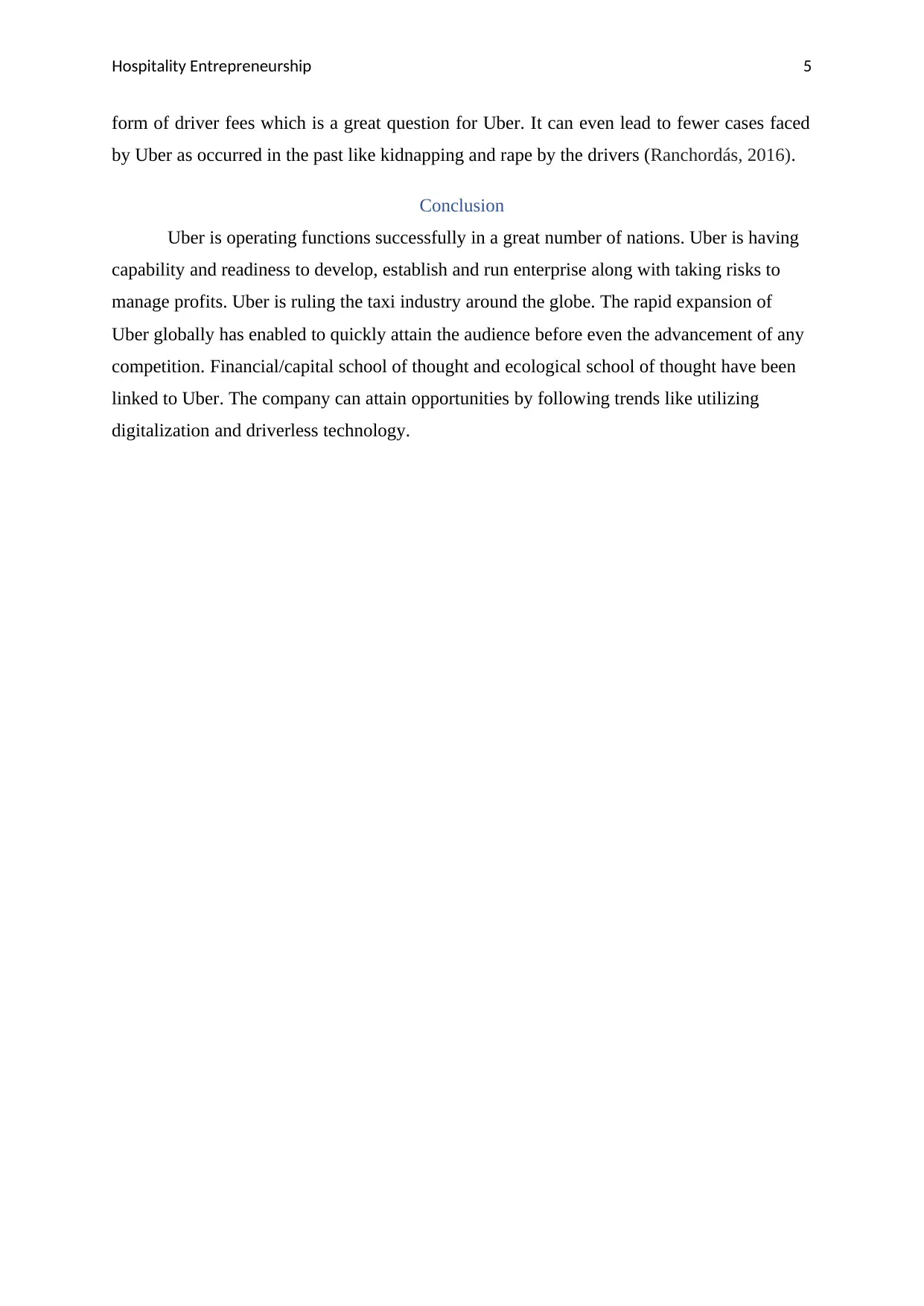
Hospitality Entrepreneurship 5
form of driver fees which is a great question for Uber. It can even lead to fewer cases faced
by Uber as occurred in the past like kidnapping and rape by the drivers (Ranchordás, 2016).
Conclusion
Uber is operating functions successfully in a great number of nations. Uber is having
capability and readiness to develop, establish and run enterprise along with taking risks to
manage profits. Uber is ruling the taxi industry around the globe. The rapid expansion of
Uber globally has enabled to quickly attain the audience before even the advancement of any
competition. Financial/capital school of thought and ecological school of thought have been
linked to Uber. The company can attain opportunities by following trends like utilizing
digitalization and driverless technology.
form of driver fees which is a great question for Uber. It can even lead to fewer cases faced
by Uber as occurred in the past like kidnapping and rape by the drivers (Ranchordás, 2016).
Conclusion
Uber is operating functions successfully in a great number of nations. Uber is having
capability and readiness to develop, establish and run enterprise along with taking risks to
manage profits. Uber is ruling the taxi industry around the globe. The rapid expansion of
Uber globally has enabled to quickly attain the audience before even the advancement of any
competition. Financial/capital school of thought and ecological school of thought have been
linked to Uber. The company can attain opportunities by following trends like utilizing
digitalization and driverless technology.
⊘ This is a preview!⊘
Do you want full access?
Subscribe today to unlock all pages.

Trusted by 1+ million students worldwide
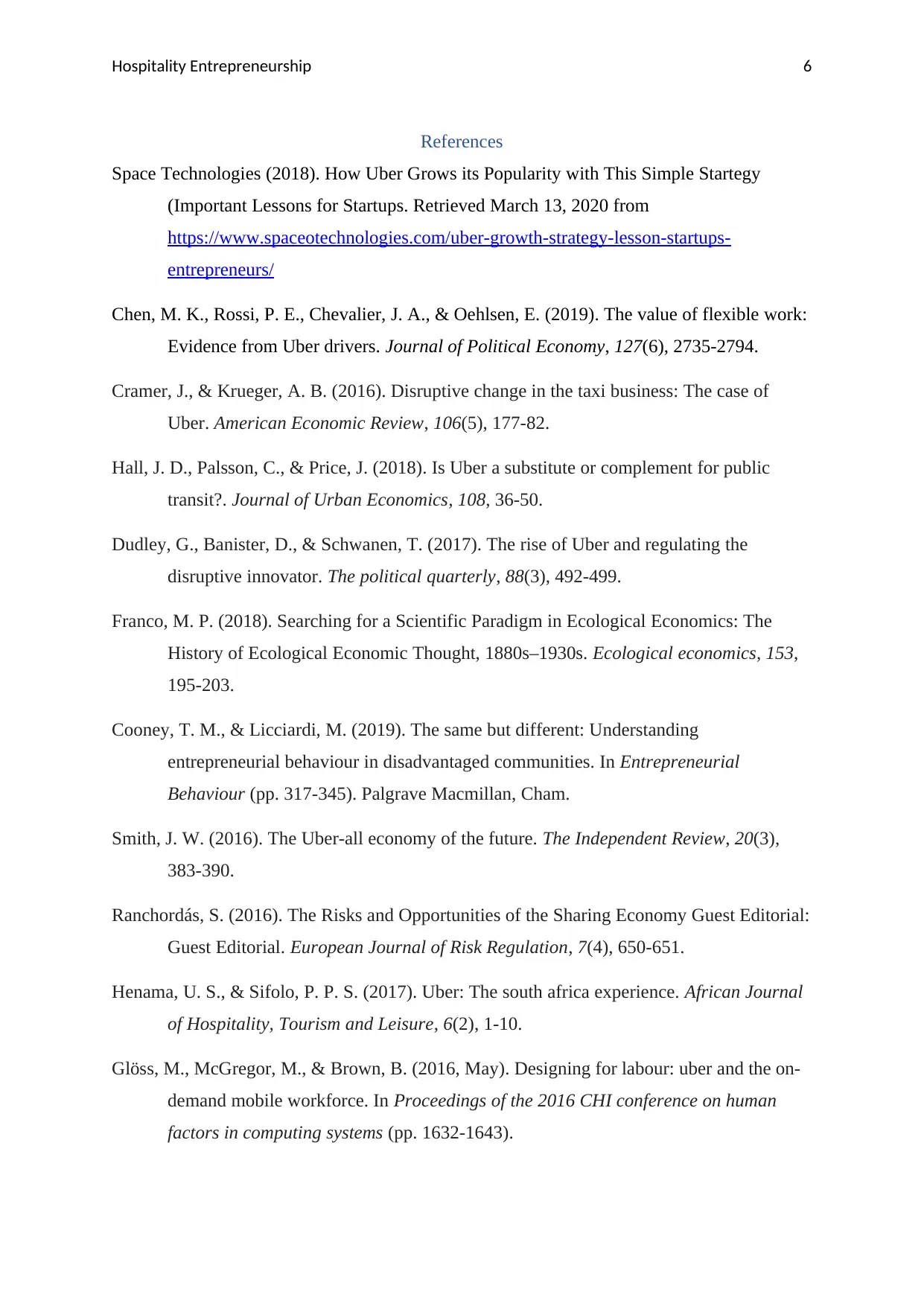
Hospitality Entrepreneurship 6
References
Space Technologies (2018). How Uber Grows its Popularity with This Simple Startegy
(Important Lessons for Startups. Retrieved March 13, 2020 from
https://www.spaceotechnologies.com/uber-growth-strategy-lesson-startups-
entrepreneurs/
Chen, M. K., Rossi, P. E., Chevalier, J. A., & Oehlsen, E. (2019). The value of flexible work:
Evidence from Uber drivers. Journal of Political Economy, 127(6), 2735-2794.
Cramer, J., & Krueger, A. B. (2016). Disruptive change in the taxi business: The case of
Uber. American Economic Review, 106(5), 177-82.
Hall, J. D., Palsson, C., & Price, J. (2018). Is Uber a substitute or complement for public
transit?. Journal of Urban Economics, 108, 36-50.
Dudley, G., Banister, D., & Schwanen, T. (2017). The rise of Uber and regulating the
disruptive innovator. The political quarterly, 88(3), 492-499.
Franco, M. P. (2018). Searching for a Scientific Paradigm in Ecological Economics: The
History of Ecological Economic Thought, 1880s–1930s. Ecological economics, 153,
195-203.
Cooney, T. M., & Licciardi, M. (2019). The same but different: Understanding
entrepreneurial behaviour in disadvantaged communities. In Entrepreneurial
Behaviour (pp. 317-345). Palgrave Macmillan, Cham.
Smith, J. W. (2016). The Uber-all economy of the future. The Independent Review, 20(3),
383-390.
Ranchordás, S. (2016). The Risks and Opportunities of the Sharing Economy Guest Editorial:
Guest Editorial. European Journal of Risk Regulation, 7(4), 650-651.
Henama, U. S., & Sifolo, P. P. S. (2017). Uber: The south africa experience. African Journal
of Hospitality, Tourism and Leisure, 6(2), 1-10.
Glöss, M., McGregor, M., & Brown, B. (2016, May). Designing for labour: uber and the on-
demand mobile workforce. In Proceedings of the 2016 CHI conference on human
factors in computing systems (pp. 1632-1643).
References
Space Technologies (2018). How Uber Grows its Popularity with This Simple Startegy
(Important Lessons for Startups. Retrieved March 13, 2020 from
https://www.spaceotechnologies.com/uber-growth-strategy-lesson-startups-
entrepreneurs/
Chen, M. K., Rossi, P. E., Chevalier, J. A., & Oehlsen, E. (2019). The value of flexible work:
Evidence from Uber drivers. Journal of Political Economy, 127(6), 2735-2794.
Cramer, J., & Krueger, A. B. (2016). Disruptive change in the taxi business: The case of
Uber. American Economic Review, 106(5), 177-82.
Hall, J. D., Palsson, C., & Price, J. (2018). Is Uber a substitute or complement for public
transit?. Journal of Urban Economics, 108, 36-50.
Dudley, G., Banister, D., & Schwanen, T. (2017). The rise of Uber and regulating the
disruptive innovator. The political quarterly, 88(3), 492-499.
Franco, M. P. (2018). Searching for a Scientific Paradigm in Ecological Economics: The
History of Ecological Economic Thought, 1880s–1930s. Ecological economics, 153,
195-203.
Cooney, T. M., & Licciardi, M. (2019). The same but different: Understanding
entrepreneurial behaviour in disadvantaged communities. In Entrepreneurial
Behaviour (pp. 317-345). Palgrave Macmillan, Cham.
Smith, J. W. (2016). The Uber-all economy of the future. The Independent Review, 20(3),
383-390.
Ranchordás, S. (2016). The Risks and Opportunities of the Sharing Economy Guest Editorial:
Guest Editorial. European Journal of Risk Regulation, 7(4), 650-651.
Henama, U. S., & Sifolo, P. P. S. (2017). Uber: The south africa experience. African Journal
of Hospitality, Tourism and Leisure, 6(2), 1-10.
Glöss, M., McGregor, M., & Brown, B. (2016, May). Designing for labour: uber and the on-
demand mobile workforce. In Proceedings of the 2016 CHI conference on human
factors in computing systems (pp. 1632-1643).
Paraphrase This Document
Need a fresh take? Get an instant paraphrase of this document with our AI Paraphraser
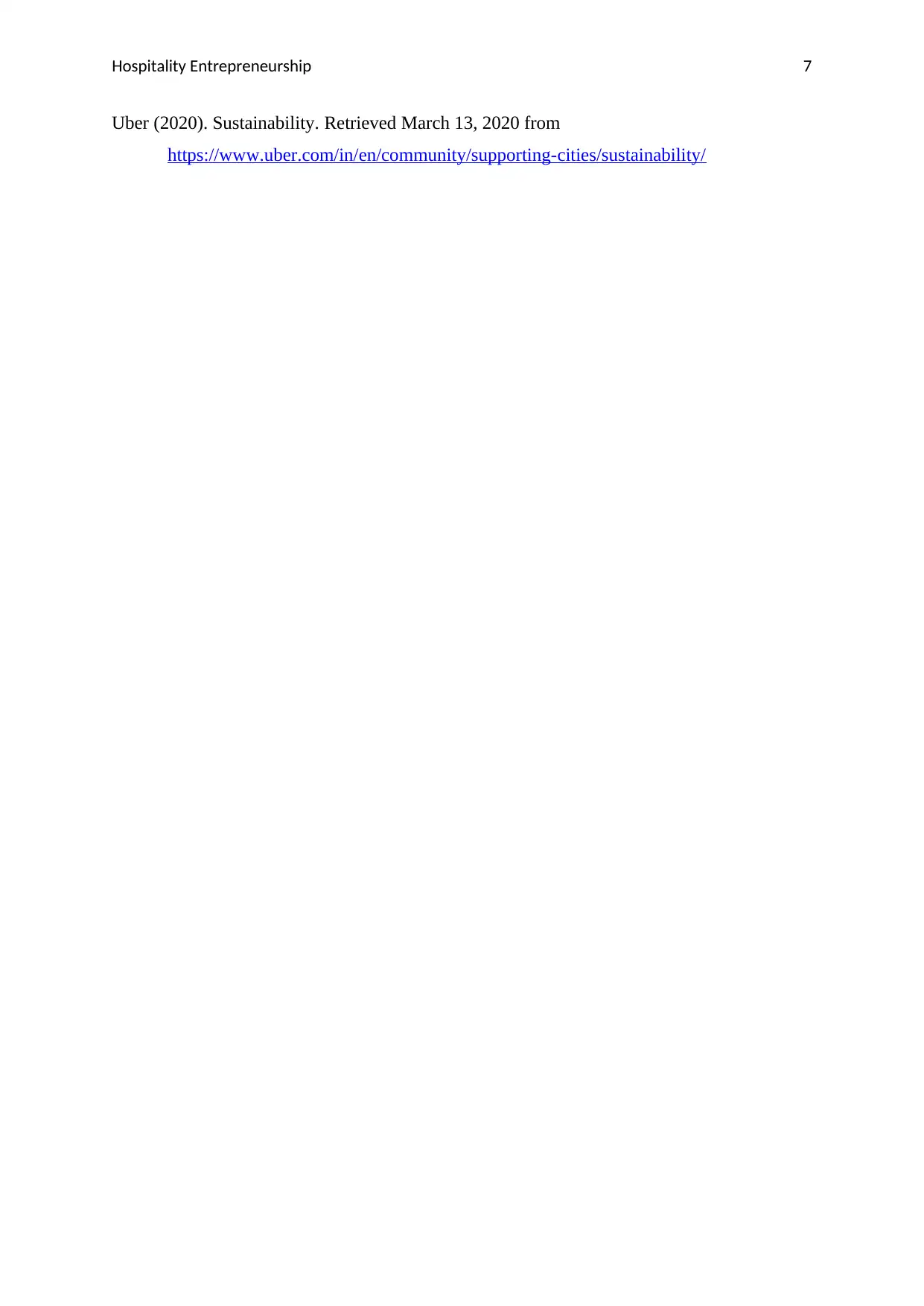
Hospitality Entrepreneurship 7
Uber (2020). Sustainability. Retrieved March 13, 2020 from
https://www.uber.com/in/en/community/supporting-cities/sustainability/
Uber (2020). Sustainability. Retrieved March 13, 2020 from
https://www.uber.com/in/en/community/supporting-cities/sustainability/
1 out of 8
Related Documents
Your All-in-One AI-Powered Toolkit for Academic Success.
+13062052269
info@desklib.com
Available 24*7 on WhatsApp / Email
![[object Object]](/_next/static/media/star-bottom.7253800d.svg)
Unlock your academic potential
Copyright © 2020–2026 A2Z Services. All Rights Reserved. Developed and managed by ZUCOL.





